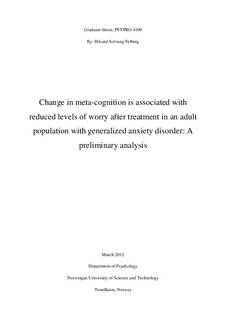| dc.contributor.advisor | Nordahl, Hans Morten | nb_NO |
| dc.contributor.author | Felberg, Håvard Solvang | nb_NO |
| dc.date.accessioned | 2014-12-19T14:42:22Z | |
| dc.date.available | 2014-12-19T14:42:22Z | |
| dc.date.created | 2012-05-22 | nb_NO |
| dc.date.issued | 2012 | nb_NO |
| dc.identifier | 527716 | nb_NO |
| dc.identifier.uri | http://hdl.handle.net/11250/270818 | |
| dc.description.abstract | The Meta-cognitive model of generalized anxiety disorder (Wells, 1995) predicts that the most important factor in development and maintenance of GAD is negative meta-cognitive beliefs about the dangers and uncontrollability of worry. The present study aimed to examine the association between degree of change in negative meta-cognition and post-treatment levels of worry following treatment of generalized anxiety with Meta-cognitive therapy and Cognitive Behavioral Therapy. The main finding of the study was that change in negative meta-cognitions accounted for more than half the variance in post-treatment worry. These preliminary results provide further empirical evidence for the role of meta-cognitive change in GAD. | nb_NO |
| dc.language | eng | nb_NO |
| dc.publisher | Norges teknisk-naturvitenskapelige universitet, Fakultet for samfunnsvitenskap og teknologiledelse, Psykologisk institutt | nb_NO |
| dc.subject | Social and Behavioural Science, Law | en_GB |
| dc.title | Change in meta-cognition is associated with reduced levels of worry after treatment in an adult population with generalized anxiety disorder: A preliminary analysis | nb_NO |
| dc.type | Master thesis | nb_NO |
| dc.source.pagenumber | 27 | nb_NO |
| dc.contributor.department | Norges teknisk-naturvitenskapelige universitet, Fakultet for samfunnsvitenskap og teknologiledelse, Psykologisk institutt | nb_NO |
